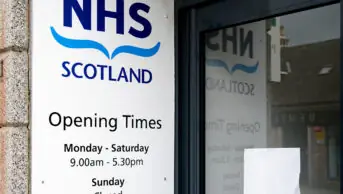
Brain light / Alamy Stock Photo
Mike Hannay is a pharmacist registered with the General Pharmaceutical Council, a fellow of the Royal Pharmaceutical Society (RPS) and the pharmaceutical science member of the RPS Assembly. The views expressed here are his own and do not reflect the views of any organisation he is associated with.
In June 2022, the chief pharmaceutical officers of England, Northern Ireland, Scotland and Wales sent an open letter to all registered pharmacy professionals in the UK announcing the establishment of a commission to produce recommendations for the purpose and functions of future pharmacy professional leadership in the UK.
The UK Commission on Pharmacy Professional Leadership, co-chaired by Nigel Clarke, former chair of the General Pharmaceutical Council (GPhC), and Dame Jane Dacre, former president of the Royal College of Physicians, should have been an opportunity to think imaginatively and collaboratively about the way the pharmacy professional bodies can develop to meet the needs of their members, and patients, in an era of pharmacy closures, an ever-changing NHS and some 13 years since the Royal Pharmaceutical Society of Great Britain was split into two organisations.
Instead, the co-chairs’ final report, published in February 2023, produces conclusions that it could be argued are entirely expected — even a re-hash of previous reviews. For example,’Advancing pharmacy education and training: a review‘, published by Health Education England (HEE) in June 2019, contained detailed recommendations for pre- and post-foundation education and training that are yet to be realised.
Although, having said that, the co-chairs’ report does contain a seismic proposal that is original; however, it is also one that would actively weaken the leadership we already have and even, I would argue, undermine the very existence of pharmacy as a profession.
There are four flaws in the proposals:
1. It will be a government-appointed body
The co-chairs’ central proposal is the creation of a new federated professional leadership framework with a collaborative Pharmacy Leadership Council (PLC) comprising three professional leadership bodies (PLBs), including the Royal Pharmaceutical Society (RPS), Pharmacy Forum NI (PFNI) and the Association of Pharmacy Technicians (APTUK), specialist professional groups, an independent chair and other expert members.
The PLC and federated framework would be underpinned by a new “duty to collaborate” for the pharmacy PLBs and specialist professional groups and would be supported by a secretariat. The council will be appointed by the chief pharmaceutical officers before transitioning to another, as yet, unspecified model.
The suspicion may be that the government is simply looking to gag the profession as we enter a period of mass pharmacy closures, continued under-funding and profound uncertainty
This move from a member-led profession to the imposition of what is, in effect, a government-appointed body is perhaps the greatest challenge of the co-chairs’ proposal; I choose the word ‘body’ carefully as no organisation can be called a profession when its leaders are government appointed. The commission talks of a transition period to an independent body of three to five years, but we have no idea what the end game is and no assurance that it would not decide to continue as a government-appointed body for much longer.
This is an important question, not just philosophically, but also practically. In the interim period, will the RPS be able to speak out about prescription charges, HRT, pharmacy closures or medicine shortages without fear of retribution? Does the commission’s “duty to collaborate” mean only chief pharmaceutical officers, Department of Health and Social Care (DHSC) or Cabinet Office approved communications and initiatives will be tolerated? The suspicion may be that the government is simply looking to gag the profession as we enter a period of mass pharmacy closures, continued under-funding and profound uncertainty.
We should remember that the role of a chief pharmaceutical officer is not a neutral one. In England, the chief pharmaceutical officer is the principal adviser to the DHSC on pharmacy, as well as a senior NHS England employee. The DHSC contract with community pharmacy in England is credited with the net closure of 720 pharmacies across England since 2015 according to the ‘Save Our Pharmacies’ campaign. Handing even greater control of the profession to the same government departments seems risky at best, suicidal at worst.
The RPS has made strides in developing strategic alliances with the medical royal colleges, culminating in the signature of a statement of strategic intent with the Academy of Medical Royal Colleges that reflects the shared vision both organisations have to improve patient care and public health and wellbeing through the application of high standards of clinical education and professional practice. How many professional bodies and royal colleges will be willing to collaborate with a pharmacy body that has a government-appointed leadership council?
There is also the small matter of whether the professional bodies are allowed by their respective constitutions to fund a government-appointed body that has not been established to advance the cause of their members and is limited in scope to only part of their membership.
2. There is no link with service provision
There are some valuable proposals on professional development including aligned UK wide curricula for post-registration education with standards and credentialing. However, this is exactly what has been developed by the RPS in collaboration with HEE and the Centre for Pharmacy Postgraduate Education and follows on from the recent success of the RPS programme to accredit pharmacist consultants. The commission’s co-chairs’ opinion that their development “without a unified professional view” and a lack of support for the regulatory process from the PLBs has undermined widespread adoption is counter intuitive and frankly unjustified.
The major problem has been the lack of engagement and support from the regulator and chief pharmaceutical officers who have consistently failed to adopt and implement advanced practitioner certification from the PLBs. The solution to making professional development and accreditation work is a link to career progression and NHS service provision, which will benefit patients, pharmacy and the wider NHS. For instance, Royal College of Surgeons qualifications are required to progress in practice, and that’s why medical royal colleges often have such a high take up of membership. This has been missing in pharmacy and — without that link between accreditation and advancement — the ambitions of unified professional development are set to wither on the vine.
3. Proposed representation model is flawed
Another problem is the likely model of the final PLC.
The commission proposed three “end states”. No change with the existing PLBs sitting under the PLC; amalgamation under one of the existing PLBs; or an entirely new body. An application for Royal College status was seen as an appropriate future option. To become a Royal College, the new or existing body would need to apply for a Royal Charter. Royal Charters are granted by the Sovereign on the advice of the Privy Council. They are normally reserved for bodies that work in the public interest, such as professional institutions, and can demonstrate pre-eminence, stability and permanence in their particular field.
There are several criteria that must be fulfilled before the Privy Council will consider an application. The first requirement states: “Applicants should comprise members of a unique profession, without significant overlap with other bodies.” The commission has referred to two pharmacy professions — pharmacists and pharmacy technicians, while forgetting the third — RPS members who are not registrants. The PLC may comprise several membership bodies and not the requisite individual members of a unique profession. There is an issue of overlap with the existing professional bodies, one of which already has royal status. On these three counts, the PLC would appear to not be able to apply for Royal College status. However, as one effectively government appointed body applying to another largely government-led body, perhaps the rules will not be applied as strictly as for other applicants.
The commission talks of the “Ph-amily”, making every pharmacy professional welcome under the new PLC. However, from the onset, the work of and communication from the commission has been limited to registered pharmacy professionals and their clinical roles. For a profession as broad as pharmacy, this leaves out a vast swathe of RPS members. Despite warm words that “there was a place for non-registrants” at a webinar held by the chief pharmaceutical officers on the 1 March 2023, there seems to be no recognition of the vital role that non-registrant pharmacy professionals play in academia, research, NHS and industry. As a simple example, pharmacy professionals are required to be members of the RPS — not registered with the GPhC — to be eligible as a Qualified Person, the people who certify every batch of medicine as being safe, efficacious and of suitable quality. Are we to exclude these valuable members of our profession?
4. No new funding has been promised
The Commission’s co-chairs’ proposals will require significant and immediate funding to take this forward, not least in the area of professional development; however, there is no plan for how and when this will be achieved. One option proposed by the commission is for the funding to come from the professional bodies, but how will this work?
If all the professional bodies selected to sit on the PLC are to have equal representation, then we must, therefore, assume any financial contribution will have to be equal. But with smaller specialist professional groups, it is likely to be insufficient to fund the establishment of the PLC and the salaries of the secretariat, let alone the ambitions of the commission.
The obvious target for a cash raid by the new PLC is the RPS. The RPS has made significant progress in building a financially sustainable professional body and, in my opinion, the government appointed PLC cannot be allowed to take RPS assets built up over the past 182 years to fund the present government’s agenda and build an additional level of bureaucracy that separates members from the leadership of our profession.
Is there a better way?
So, is the commission’s report a complete write off? Possibly. As it stands, the planned government-appointed PLC makes it incredibly difficult for any professional body to sign up, as they will be signing away their freedom to challenge government policy and act independently. The profession has some great leaders, so why not allow the members of the profession to elect the PLC? If the commission doesn’t believe the profession can elect its own leaders, then I for one will not be supporting the RPS in joining the PLC.
Limiting representation to GPhC registrants and their clinical role is short-sighted, but if a clinical voice is needed for pharmacy perhaps a ‘Clinical Pharmacy Advisory Council’ to government could replace the proposed PLC, bringing together the appropriate PLBs and specialist professional groups (SPGs) under a truly independent chair elected by members of the PLBs and SPGs. This would seem a much better fit with the stated aims of the chief pharmaceutical officers and would address concerns about the loss of our independent profession.
Finally, to really deliver value for the profession and, more importantly, patients, the chief pharmaceutical officers need to put government money behind the development proposals, funding the development of advanced practice, linking career progression to advanced practice accreditation and ensuring future NHS service provisions require pharmacy professionals with appropriate advanced practice accreditation from the PLBs. As a single move, this would improve patient outcomes by upskilling the pharmacy workforce, boosting retention and ultimately addressing some of the pressures in the wider NHS.
If we can enhance the good proposals from the independent commission’s report, there are some great opportunities. However, in its current form, this could be the end of our illustrious profession.
If you wish to submit a letter or any correspondence to be considered for publication on this topic or any other issue, please email: editor@pharmaceutical-journal.com
2 comments
You must be logged in to post a comment.



I agree with Mike Hannay's analysis of the proposals for a Government appointed PLC to oversee the leadership of the
profession and share his concerns about the government's intentions
Royal College status seems the best option but would be very difficult to acheive given that a Government recommendation to the Sovereign is required
DVid Carrington
This article appears to rely on the misguided contention that Government is intent on undermining the natural order of professional leadership within the profession. Nothing could be further from the truth. The CPhOs are naturally concerned to ensure that leadership of the profession is “fit for future” given the professional developments and increasingly clinical roles which members of the profession will discharge over the coming years to the benefit of their patients. Nothing more, nothing less. And certainly not the conspiratorial concerns expressed by Professor Hannay. The independently chaired transitional advisory PLC will be charged with developing and delivering what the profession believes is needed. I emphasise the word “profession”. Its deliberations and recommendations will be informed and shaped through wide ranging consultation with all interested parties, and should ultimately a Royal College be decided upon it will be established without impediment. Thankfully the recent RPS AGM motion in the authors name, which unbelievably called for the RPS to refrain from all involvement in the PLC, was resolutely defeated. It is perhaps instructive to point out that if the RPS had followed through on its remit to establish itself as the Royal College for the profession (a very clearly articulated “end game” when it was established in 2010) then quite probably we would not now be having this discussion. We have “lost” at least 5 years in not doing so, and we now need to move with pace and determination to establish what is required.